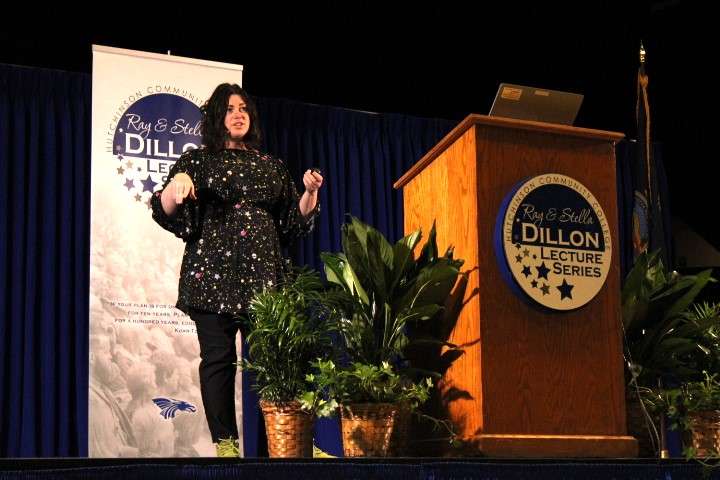
EMMIE BOESE
Hutch Post
HUTCHINSON, Kan. — Dr. Janelle Shane is a researcher in A.I. which stands for artificial intelligence. Shane shared her expertise on the subject at the 2024 Ray and Stella Dillon Lecture Series on Tuesday, Jan. 20.
Shane's first encounter with A.I. was at a lecture she attended as an undergraduate student. The lecture was about about a professor's work on genetic algorithms and how to imitate principles of evolution to evolve answers to a problem.
"He would talk about hey you would get this if you were trying to evolve a design for a flywheel," Shane said. "You would get a flywheel that worked but you didn't sometimes understand how it worked because nobody had designed it and nobody could explain it to you but it works and it's like this weird artifact. That struck my fancy as oh yeah this is a kind of computing where you don't know what you are going to get. It could be a surprise and sometimes it's hilarious. So he would talk about examples where it seemed to be working really well. Like this molecular structure it had simulated and then you go back and look at it and you say oh it put all of the atoms in the same point in space which is physically impossible but you didn't tell it not to do that and so that got me interested in hey what other weird things can I encounter if I work in this field."
A.I. is a simulation of human intelligence that is processed by machines and computing systems. It enables computers and digital devices to perform functions like read, write and talk. Examples' of usage include X-ray readings, identification of fraudulent transactions in the bank system and stock management in retail.
"I think the best applications for A.I. are these helpful widgets that are giving you data that you can use or not," Shane said. "Of things that you can check or not. So for example, I like not having to listen to all of my voicemails to find out what they are about. You know its not a perfect transcription but it works enough that it's super useful and saves me time."
Shane said there are A.I. dangers to watch out for. Mainly around the concept of passing A.I. generated work off as one's own.
"So how you are going to define plagiarism in this day and age, if you can't point to this paragraph and say oh yes obviously it does make it tricker to detect," Shane said. "And to point out and to use to tell people to stop but if you are asking about a moral line then there is going to be some fuzziness about it but this idea, of taking an A.I. generated summary, or an A.I. generated rewarding and saying there it is I've done it, its you know, you didn't do any of the work yourself, I would say that would be over the line."
Shane graduated from Michigan State University with a B.S. degree in Electrical Engineering, a MPhil from the University of St. Andrews and a PhD from the University of California San Diego.
Her book on the subject of A.I. is titled "You look Like a Thing and I Love You: How AI Works and Why It's making the World a Weirder Place." She also has an AI humor blog, titled AIweirdness.com.
The next lecture in the Dillon Lecture Series is on April 16. The lecturer is author David Grann. He authored Killers of the Flower Moon which documents the Osage Murders and the Birth of the FBI. The book has been adapted into a major motion picture. Actress Lily Gladstone won best actress at the 2024 Oscar Awards for her performance in the film.
CLICK HERE to download the Hutch Post mobile app.
CLICK HERE to sign up for the daily Hutch Post email news update.





